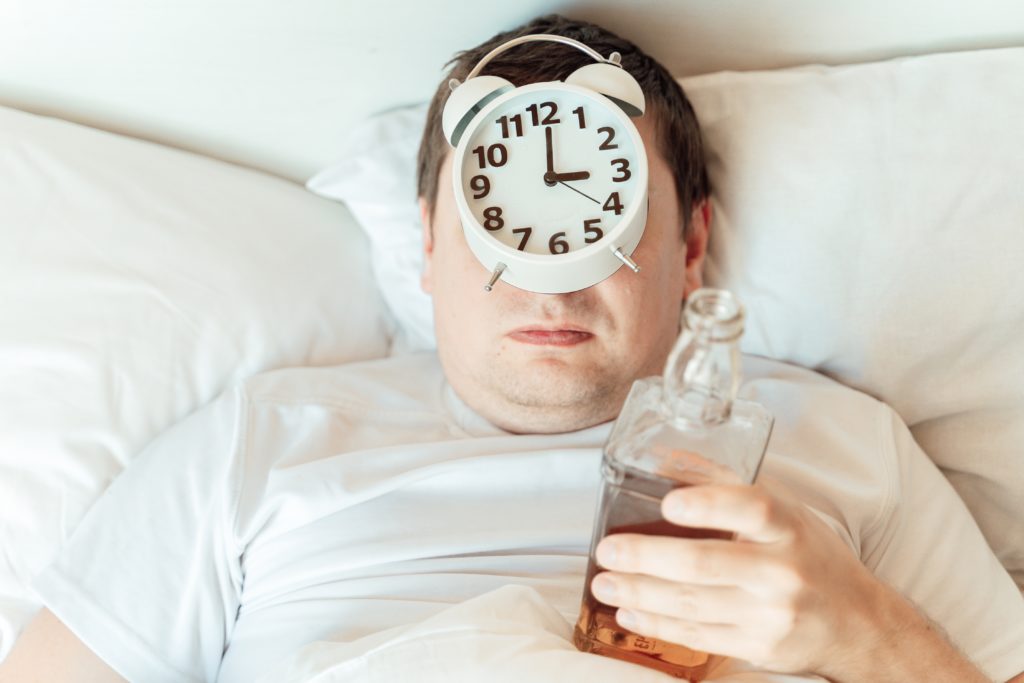As you wind down after a long day with a relaxing glass of wine, the last thing on your mind is ‘how does alcohol affect sleep?’
But if you’re struggling to get some quality sleep, that nightcap is likely doing more harm than good.
Even though your nightly routine of having a drink before bed may seem like it’s helping you drift off, there are several reasons why alcohol negatively affects sleep.
If you are the type of person who enjoys a drink before bed, read on to learn how alcohol affects sleep and eight surprising consequences of your nighttime cocktail.
(Note. While we earn commission from the links in this article, we only recommend the products we truly believe will improve your sleep the most. These commissions come at no extra expense to you and help us to keep providing you with expert sleep information for free.)
Why Can’t I Sleep When I Drink Alcohol?

Everyone knows that excessive drinking has major effects on your physical health, mental health, and general wellbeing. Heavy alcohol consumption impairs sleep quality and leads to the dreaded hangover the next day.
When you look at sleep specifically, it’s not only heavy drinking that causes problems — moderate drinking or even an occasional glass can have major effects on sleep.
Dr. Russell Foster, a preeminent sleep specialist, explains exactly why you can’t sleep when you drink alcohol before bed,
“Now alcohol, short-term, once or twice, to use to mildly sedate you, can be very useful. It can actually ease the sleep transition. But what you must be so aware of is that alcohol doesn’t provide sleep. A biological mimic for sleep, it sedates you. So, it actually harms some of the neural processing that’s going on during memory consolidation and memory recall. So, it’s a short-term acute measure, but for goodness sake, don’t become addicted to alcohol as a way of getting to sleep every night.”
If you think you may have a dependence on alcohol to sleep, seek help from a medical professional.
While alcohol can have some short-term benefits to help with sleep onset, it should not be used as a regular sleep aid because the negative long-term effects and risk of sleep disorders just aren’t worth it.
How Does Alcohol Affect Sleep? Here’s How.
To sleep better at night, it’s best tp put down the glass and seriously consider the negative effects of consuming alcohol before bed.
Here are nine ways alcohol affects sleep.
1. It’s true. A drink before bedtime improves sleep latency
While this article focuses on the negative consequences of using alcohol for sleep, there is one positive effect of alcohol on sleep – it improves sleep latency or sleep onset.
Sleep latency or sleep onset latency simply means your ability to fall asleep. But as Dr. Foster explains, this method should only be used in an acute situation and not something that should become a routine.
The sedative effects of alcohol may help you drift off, but it does not provide you with real sleep.
If you like to have a glass of wine with dinner, don’t stress out. As long as you eat and drink a few hours before bed, you should be fine.
2. Alcohol reduces restorative sleep

Sleep experts explain that one of the most important functions of sleep is restoration. However, one of the most troubling effects of alcohol is that is causes a 24% reduction in restorative sleep.
So right off the bat, if you drink alcohol, you can expect a significant reduction in your restorative sleep. Your brain needs restorative sleep to be able to retain and recall memories, among other critical neural functionalities.
Put down the glass and opt for something that will induce sleep naturally and support good, restorative sleep, like a chamomile tea.
3. Alcohol causes late-night sleep disruption

Studies show that sleep disturbances are prominent prior to and during alcohol withdrawal.
While alcohol withdrawal is typically associated with alcoholics, if you only have a couple drinks before bedtime, your body still needs to go through withdrawal (albeit minor in comparison to that of an alcoholic).
Disruption of sleep can include frequent awakenings, changes in body temperature, lack of movement leading to poor blood circulation in your limbs, worsening of sleep apnea, and a host of other issues that are sure to cause a lack of sleep.
If alcohol is part of your bedtime routine, you can likely expect to experience frequent awakenings. Over time, the long-term effects of night after night of disturbances can result in poor sleep quality, sleep deprivation, and other sleep issues.
4. Alcohol delays your REM sleep
REM sleep, or Rapid Eye Movement sleep, is one stage of sleep.
REM cycles are evidenced by a flurry of brain activity as opposed to deep sleep which is slow wave sleep.
This sleep stage is responsible for memory consolidation and is the point in your sleep where you dream, among other things. REM is a critical part of sleep architecture and brain health.
But if you are someone who likes drinking before bedtime, your REM sleep will be decrease (as will your deep sleep and sleep efficiency).
In fact, that the risk of developing probable REM sleep behavior disorder (pRBD) is 23% higher among drinkers, regardless of what type of alcohol is consumed.
Consider skipping that cocktail before bed if you don’t want to disrupt your dream factory.
5. The diuretic effects of alcohol cause disturbed sleep

‘Diuretic effects’ is a medical way of saying that alcohol makes you pee — talk about a sleep disruption.
Because alcohol is a diuretic, it causes you to need to go to the bathroom more often and destroys your sleep continuity.
The need to urinate more does not jive with trying to get a good night’s sleep. The disruptive effect of repeated trips to the bathroom affects your overall quality of sleep.
Watch the timing of your alcohol intake. Try to stop your drinks a few hours before bedtime if you hope to get some more normal sleep.
6. Regular alcohol consumption increases the risk of sleep apnea
Obstructive sleep apnea, also simply called sleep apnea, is a potentially serious sleep disorder.
If you have sleep apnea, your breathing repeatedly stops and starts during the night, sometimes for a very prolonged period. This reduces the amount of oxygen you get.
If you are a drinker before bed, you may be playing with fire because studies show that not only does regular alcohol consumption increase the risk of sleep apnea, but it also worsens the symptoms of existing sleep apnea.
Symptoms of sleep apnea include snoring and next-day fatigue after a full night’s sleep. In some cases, sleep apnea can cause sudden death. The consequences of sleep apnea are no joke.
If you are getting a full night’s sleep but waking up feeling tired, put down the drink before bedtime and go speak with a medical professional.
7. High blood pressure makes it harder to sleep

Studies show that alcohol consumption increases blood pressure. In turn, high blood pressure, besides putting you at increased risk of heart attack and stroke, can make it harder for you to sleep.
Blood pressure and heart rate naturally decrease as part of a normal sleep cycle. But if you are keeping it artificially elevated, that can lead to disturbances in your sleep.
And here’s the kicker, mounting evidence shows that poor sleep also causes an increase in blood pressure. This is a dangerous cycle to get into.
8. Long-term consumption results in alcohol-related insomnia

There are plenty of reasons that you may be sleeping badly, but if you regularly consume alcohol before bed, you may be suffering from alcohol-related insomnia.
In alcohol-dependent people, the prevalence of insomnia ranges from 36%-91% and the insomnia may persist even after alcohol withdrawal.
Long-term consumption and alcohol dependency not only causes harm now, but can also set you up for future sleep disorders and chronic insomnia.
If you find that you can’t go a few days without drinking before bed, you may be dependent and should seek treatment from a medical professional.
9. A couple of drinks before bed makes your snoring worse

Not only is snoring bad for you, but it’s really bad if you have a partner. You are disrupting your own sleep and possibly causing major sleep deprivation for the person next to you. That’s enough to consider putting down that glass of wine before bed.
Studies show that alcohol consumption worsens the severity of snoring, alters sleep architecture, and results in the lowest levels of oxygen saturation for people with obstructive sleep apnea. Snoring is a nuisance but when you start messing with things like sleep apnea, it can be fatal.
Not sure what to do if your partner snores? Worried about your own snoring? Try limiting alcohol before bedtime.
In conclusion…
While moderate alcohol consumption has been shown to have positive health effects in other areas of your life, sleep is not one of them. The negative impact of alcohol on quality sleep is clear.
Essentially, alcohol has a sedative effect, mimicking quality sleep. However, it’s responsible for numerous types of sleep disruption which results in uncomfortable symptoms from a lack of sleep.
Consider switching your evening beverage to something like chamomile or passion flower tea which both can help support good sleep health. Alternatively, try the CBD Starter Kit by Tranquil Earth.
If you feel that you may be dependent on alcohol, seek help from a medical professional.
Need more help improving your quality of sleep? Check out our ultimate guide on how to sleep better at night.

Welcome to Snoozerville! I’m Dr. Alex Hartley, your guide to the world of restful sleep. With a Ph.D. in Sleep Science and years of experience as a sleep therapist, I’ve dedicated my life to understanding and improving sleep quality. My passion lies in uncovering the mysteries of sleep and sharing practical, science-backed advice to help you achieve the best rest possible. Beyond my academic pursuits, I’m an advocate for mindfulness and relaxation techniques, which I incorporate into my daily routine. At Snoozerville, I aim to transform your nights, combining the latest research with easy-to-implement tips. Whether you’re a chronic insomniac or just looking to improve your sleep hygiene, join me on this journey towards peaceful, rejuvenating sleep.

